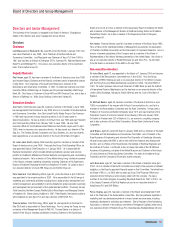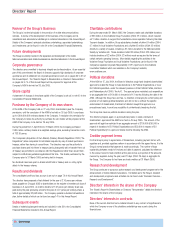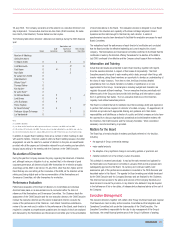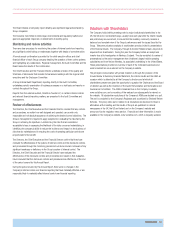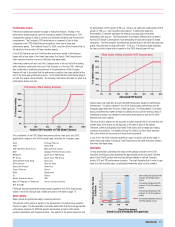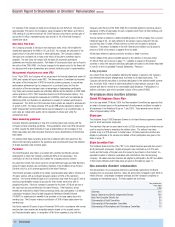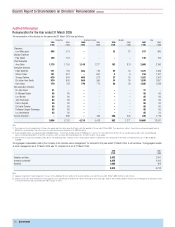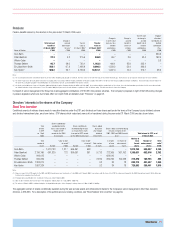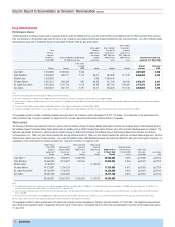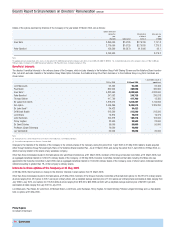Vodafone 2005 Annual Report Download - page 67
Download and view the complete annual report
Please find page 67 of the 2005 Vodafone annual report below. You can navigate through the pages in the report by either clicking on the pages listed below, or by using the keyword search tool below to find specific information within the annual report.
Board’s Report to Shareholders on Directors’ Remuneration
Governance |65
Dear Shareholder
Since the introduction of the current Executive Remuneration Policy in 2002 (the
“Policy”), the Remuneration Committee has conducted annual reviews to ensure that
the Policy continues to serve the Company and shareholders. This year, the Chairman
and I have again maintained proactive dialogue on remuneration matters with the
Company’s major shareholders and relevant institutions. The objectives of this dialogue
are to provide information about the Company and its views on remuneration issues
and to listen to shareholders’ opinions on any proposed adjustments to the Policy and
remuneration governance generally.
As a result of this year’s review, the Remuneration Committee has concluded that the
existing policy remains appropriate. The key principles of the Policy, which have not
changed, are:
•the expected value of total remuneration will be benchmarked against the relevant
market;
•a high proportion of total remuneration will be delivered through performance-
related payments;
•performance measures will be balanced between absolute financial measures and
sector comparative measures to achieve maximum alignment between executive
and shareholder objectives;
•the majority of performance-related remuneration will be provided in the form of
equity; and
•share ownership requirements will be applied to executive directors.
The Committee has approved three changes within the existing framework. In March
2005, the Chairman stepped down as a member of the Remuneration Committee to
address the issue of the Remuneration Committee comprising only independent non-
executive directors. Sir John Bond has been appointed a member of the Committee
with effect from 1 April 2005. Secondly, the Short Term Incentive Plan has been
reviewed to ensure that performance measures continue to align with the Company’s
strategy. The current financial year sees a change from EBITDA to Operating Profit
(EBIT), greater focus on total service revenue, and a change in the measure of
customer satisfaction. Finally, re-testing provisions will be removed from share options
granted in 2005.
At the start of this year’s review, I examined how well incentive awards made in
previous years had aligned with the Company’s performance. I am pleased to say that
the Policy implementation has worked well and forecast rewards are commensurate
with actual performance. I am confident that the Policy will continue to align
executives’ interests with the interests of shareholders, whilst enabling the Company to
engage a high calibre team to successfully lead the Company. During the year,
Committee members and I conducted a formal review of the Committee’s effectiveness
and concluded that it was effective and able to fulfil its terms of reference. I hope that
we receive your support at the AGM on 26 July 2005.
Penny Hughes
Chairman of the Remuneration Committee
24 May 2005
Remuneration Committee
The Remuneration Committee is comprised to exercise independent judgement and
consists only of independent non-executive directors. Penny Hughes (Chairman), Dr
Michael Boskin, Professor Jürgen Schrempp and Luc Vandevelde all continue as
members. Lord MacLaurin stepped down from the Committee in March 2005. He
was replaced by Sir John Bond with effect from 1 April 2005. Lord MacLaurin will be
invited to attend meetings as an observer and adviser but will not be entitled to vote.
The Chief Executive is invited to attend meetings of the Remuneration Committee, other
than when his own remuneration is being discussed.
The Remuneration Committee met on six occasions during the year. The Remuneration
Committee appointed and received advice from Towers Perrin (market data and advice
on market practice and governance) and Kepler Associates (performance analysis and
advice on performance measures and market practice) and received advice from the
Group Human Resources Director and the Group Compensation and Benefits Director.
The advisers also provided advice to the Company on general human resource and
compensation related matters.
Remuneration Policy
The Policy was approved by shareholders in July 2002. The Policy is set out below:
The structure of remuneration for executive directors under the Policy (excluding
pensions) is illustrated below:
The Policy’s key objective is to ensure that there is a strong linkage between pay and
performance. This is achieved by approximately 80% of the total package (excluding
pensions) being delivered through performance-linked short and long term incentive
plans. Therefore, the only guaranteed payment to executive directors is their base
salary.
The Remuneration Committee selects performance measures for incentive plans that
provide the greatest degree of alignment with the Company’s strategic goals and that
are clear and transparent to both directors and shareholders. The performance
measures adopted incentivise both operational performance and share price growth.
The overriding objective of the Policy on incentives is to ensure that Vodafone is
able to attract, retain and motivate executives of the highest calibre essential to
the successful leadership and effective management of a global company at the
leading edge of the telecommunications industry. To achieve this objective,
Vodafone, from the context of its UK domicile, takes into account both the UK
regulatory framework, including best practice in corporate governance,
shareholder views, political opinion and the appropriate geographic and
nationality basis for determining competitive remuneration, recognising that this
may be subject to change over time as the business evolves.
The total remuneration will be benchmarked against the relevant market.
Vodafone is one of the largest companies in Europe and is a global business;
Vodafone’s policy will be to provide executive directors with remuneration
generally at levels that are competitive with the largest companies in Europe. A
high proportion of the total remuneration will be awarded through performance-
related remuneration, with phased delivery over the short, medium and long term.
For executive directors, approximately 80% of the total expected remuneration
will be performance-related. Performance measures will be balanced between
absolute financial measures and sector comparative measures to achieve
maximum alignment between executive and shareholder objectives.
All medium and long term incentives are delivered in the form of Vodafone
shares and options. Executive directors are required to comply with share
ownership guidelines.
Base Salary Short / Medium
Term Incentive
Deferred share
bonus
Long Term
Incentive
Variable
Fixed
Circa 20% Circa 80%
Performance
Shares Share
Options


